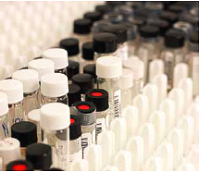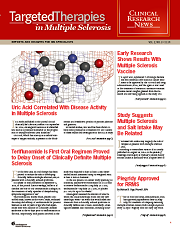Publication
Article
Targeted Therapies: Multiple Sclerosis
Early Research Shows Results with Multiple Sclerosis Vaccine
Author(s):
In April 2010, Provenge became the first dendritic cell vaccine in cancer treatment to be approved by the US Food and Drug Administration, and the agent is now used in the treatment of metastatic castration-resistant prostate cancer. Insights gleaned from this research are now being applied in the study of a potential vaccine for multiple sclerosis treatment and prevention.

In April 2010, sipuleucel-T (Provenge) became the first dendritic cell vaccine in cancer treatment to be approved by the US Food and Drug Administration (FDA), and the agent is now used in the treatment of metastatic castration-resistant prostate cancer. Insights gleaned from this research are now being applied in the study of a potential vaccine for multiple sclerosis (MS) treatment and prevention.
“We discovered that DC-ASGPR, one of the receptors expressed on human dendritic cells, has novel functions to promote antigen-specific regulatory T cells that can efficiently suppress inflammatory responses,” said principal investigator SangKon Oh, PhD, from the Baylor Institute for Immunology Research, in a press release. “This prompted us to test our discovery in autoimmune diseases where antigens are known.”
Traditional treatments for MS may trigger immune system—related side effects and adversely affect the immune system even though they demonstrate efficacy. Oh launched lab research 3 years ago along with colleagues Gerard Zurawski, PhD, and Ted Phillips, MD, PhD, using a significantly different approach.
“Oh’s approach is a very unique effort that would harness one’s own immune system to suppress MS in an auto antigen—specific manner without disrupting other aspects of normal immunity,” said Phillips, a neurologist whose work has focused on MS for more than 3 decades. Results have been positive, according to Oh, who said they are hopeful this study can enter a phase I clinical trial within the next 3 years. Researchers will also apply these findings to future studies about dendritic cell vaccines, including a planned research effort for type 1 diabetes mellitus.
“We need new treatments that, while highly efficacious, also minimally adversely impact the individual’s immune system,” Phillips said.
Reference
Newswise. Baylor Research Institute immunology researchers obtaining promising results with multiple sclerosis vaccine. http://www.newswise.com/articles/view/623660/?sc=mwhr&xy=10013055. Accessed October 20, 2014.






